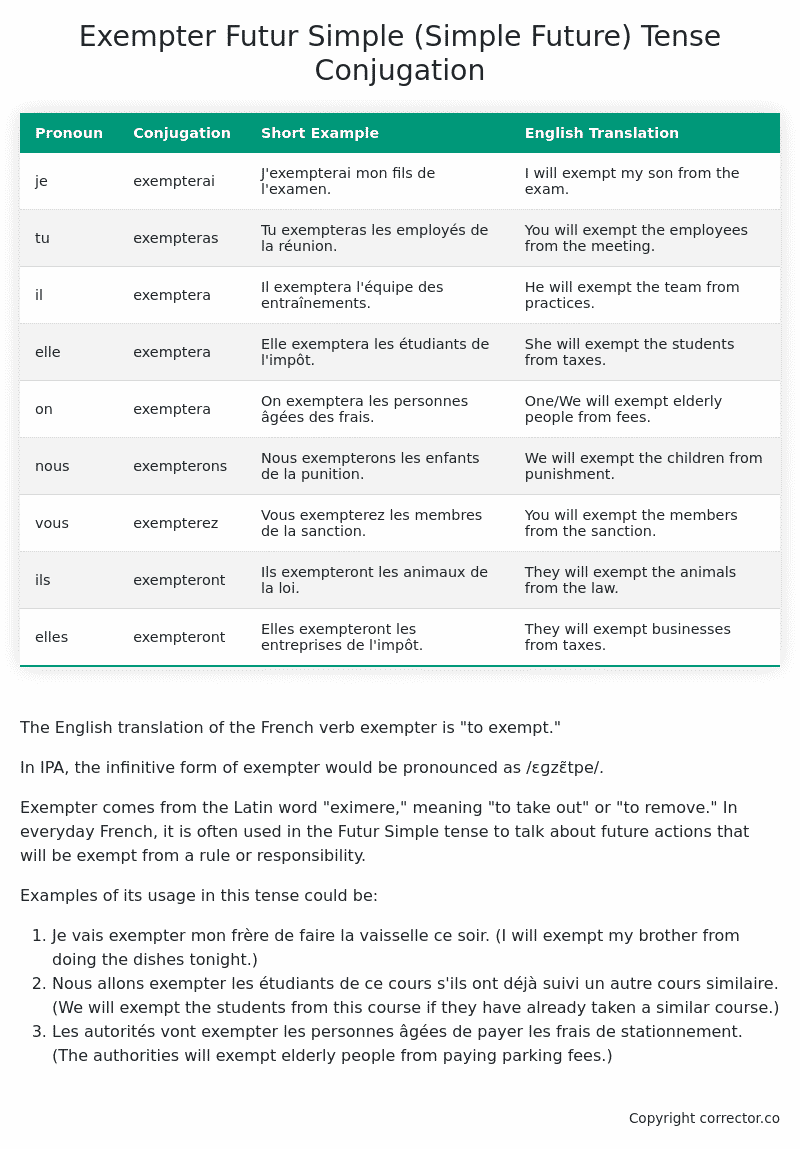Futur Simple (Simple Future) Tense Conjugation of the French Verb exempter
Introduction to the verb exempter
The English translation of the French verb exempter is “to exempt.”
In IPA, the infinitive form of exempter would be pronounced as /ɛɡzɛ̃tpe/.
Exempter comes from the Latin word “eximere,” meaning “to take out” or “to remove.” In everyday French, it is often used in the Futur Simple tense to talk about future actions that will be exempt from a rule or responsibility.
Examples of its usage in this tense could be:
- Je vais exempter mon frère de faire la vaisselle ce soir. (I will exempt my brother from doing the dishes tonight.)
- Nous allons exempter les étudiants de ce cours s’ils ont déjà suivi un autre cours similaire. (We will exempt the students from this course if they have already taken a similar course.)
- Les autorités vont exempter les personnes âgées de payer les frais de stationnement. (The authorities will exempt elderly people from paying parking fees.)
Table of the Futur Simple (Simple Future) Tense Conjugation of exempter
| Pronoun | Conjugation | Short Example | English Translation |
|---|---|---|---|
| je | exempterai | J’exempterai mon fils de l’examen. | I will exempt my son from the exam. |
| tu | exempteras | Tu exempteras les employés de la réunion. | You will exempt the employees from the meeting. |
| il | exemptera | Il exemptera l’équipe des entraînements. | He will exempt the team from practices. |
| elle | exemptera | Elle exemptera les étudiants de l’impôt. | She will exempt the students from taxes. |
| on | exemptera | On exemptera les personnes âgées des frais. | One/We will exempt elderly people from fees. |
| nous | exempterons | Nous exempterons les enfants de la punition. | We will exempt the children from punishment. |
| vous | exempterez | Vous exempterez les membres de la sanction. | You will exempt the members from the sanction. |
| ils | exempteront | Ils exempteront les animaux de la loi. | They will exempt the animals from the law. |
| elles | exempteront | Elles exempteront les entreprises de l’impôt. | They will exempt businesses from taxes. |
Other Conjugations for Exempter.
Le Present (Present Tense) Conjugation of the French Verb exempter
Imparfait (Imperfect) Tense Conjugation of the French Verb exempter
Passé Simple (Simple Past) Tense Conjugation of the French Verb exempter
Passé Composé (Present Perfect) Tense Conjugation of the French Verb exempter
Futur Simple (Simple Future) Tense Conjugation of the French Verb exempter (this article)
Futur Proche (Near Future) Tense Conjugation of the French Verb exempter
Plus-que-parfait (Pluperfect) Tense Conjugation of the French Verb exempter
Passé Antérieur (Past Anterior) Tense Conjugation of the French Verb exempter
Futur Antérieur (Future Anterior) Tense Conjugation of the French Verb exempter
Subjonctif Présent (Subjunctive Present) Tense Conjugation of the French Verb exempter
Subjonctif Passé (Subjunctive Past) Tense Conjugation of the French Verb exempter
Subjonctif Imparfait (Subjunctive Imperfect) Tense Conjugation of the French Verb exempter
Subjonctif Plus-que-parfait (Subjunctive Pluperfect) Tense Conjugation of the French Verb exempter
Conditionnel Présent (Conditional Present) Tense Conjugation of the French Verb exempter
Conditionnel Passé (Conditional Past) Tense Conjugation of the French Verb exempter
L’impératif Présent (Imperative Present) Tense Conjugation of the French Verb exempter
L’infinitif Présent (Infinitive Present) Tense Conjugation of the French Verb exempter
Struggling with French verbs or the language in general? Why not use our free French Grammar Checker – no registration required!
Get a FREE Download Study Sheet of this Conjugation 🔥
Simply right click the image below, click “save image” and get your free reference for the exempter Futur Simple tense conjugation!

Exempter – About the French Futur Simple (Simple Future) Tense
Formation of Futur Simple
For regular -er verbs (e.g., parler – to speak)
For regular -ir verbs (e.g., finir – to finish)
For regular -re verbs (e.g., vendre – to sell)
Common Everyday Usage Patterns
Conditional Statements
Interactions with Other Tenses
Futur Antérieur
Conditional
Present
Summary
I hope you enjoyed this article on the verb exempter. Still in a learning mood? Check out another TOTALLY random French verb conjugation!


